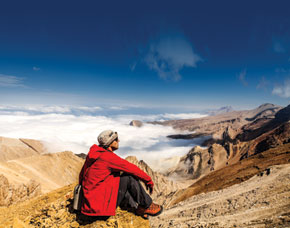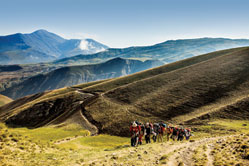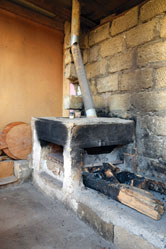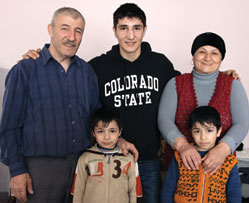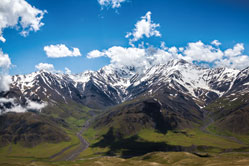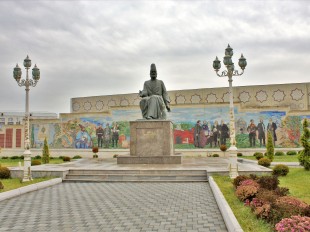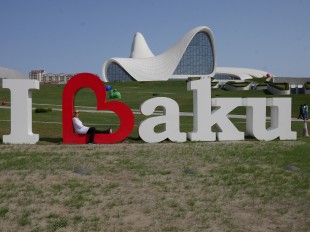Jo Burge enjoys a taste of Azerbaijani life at a Community Based Tourism homestay.
The Qafarov family dining room is warm from the stove and hot pans of food simmering in the open kitchen. The large wooden table is crammed with traditional dishes: kelem dolmasi (stuffed cabbage leaves), plov with qazmaq (rice with a highly prized crust), fresh shuba salad (‘fur coat salad’ – potatoes, eggs, beetroot, carrots, mayonnaise and spices), home-made lavash (soft, thin flat bread), along with a bottle of sweet compote (cherry drink) and several tulip-shaped glasses of çay (tea).
Chatter surrounds in Lezghi, loud and overlapping between mum Zenura (51), dad Qafur (57), daughter Roza (29) and her two boys. Seventeen-year old son Yashar, my faithful translator, is on his laptop in the corner (‘chatting to girls’, says Zenura, amused). Next door my bed is made for the night, piled high with three heavy blankets to block out the cold.
We are in Qusar, north Azerbaijan, 180 km away from the polished boulevard, neat parks and futuristic architecture of the capital Baku. In the distance lie the snowy peaks of the Greater Caucasus, overlooking this steep, agricultural, and now tourist, town. It’s March, an unusual time for visitors – who usually come to escape Baku’s oppressive summer heat – but the Qafarov family is always happy to have guests.
In at the start
The Qafarovs first opened their home in 2009. Theirs was the house that launched the unofficial Peace Corps project, Community Based Tourism (CBT). Volunteers founded it as a side project in order to provide travellers with an authentic experience of local Azerbaijani life.
It started with Peace Corps volunteer Micah Lund, who, as is the Peace Corps tradition, had a local host family – the Qafarovs. The Qafarovs loved the international presence of the American and his friends so much that Micah suggested to Qafur creating extra sleeping space, while he encouraged new visitors.
Qafur, a builder by trade, sectioned off the back of the house to make a studio (bedroom and kitchen), with a separate entrance via the courtyard. At the far side of the courtyard, with the help of Yashar he built another, similar studio, where he and Zenura sleep while guests take their bedroom in the main house. But he’s not stopping there: I want to build a central heating system so all the rooms in the house are heated, and do more painting and decorating.
Scenic homestays
Meanwhile, the Peace Corps grew a portfolio of homestays on the new scheme. In five years CBT now offers 21 homestays in 10 regions across Azerbaijan; from Europe’s highest village and premier hiking destination of northern Khinaliq, to Qakh further east, close to natural hot springs where you can soak in healing minerals, to the southern district of Lerik, with fishing, waterfalls and tales of human longevity.
But, like any entrepreneurial venture in a post-Soviet country, it’s not without its challenges. Peace Corps volunteer and CBT CEO Joel Heyman, also staying with the Qafarovs, is responsible for the overall management and development of the company. He explains: This is a culture that is slowly learning how to lay out plans and measurable goals, navigate bureaucracy, and provide the level of customer service that guests from developed nations expect. Additionally, Azerbaijan has laws in place that can make entry into the country confusing.
Each destination offers a unique take on Azerbaijani life, with its varied ethnicities and colourful cultures. Here in Qusar the population is predominantly Lezghi (an ethnic group which also lives across the Russian border in Dagestan). Lezghis speak their own language and have their own traditional dance, food and art forms.
Zenura will teach you how to bake delicious Lezghi lavash in her clay oven in the courtyard. If you stay outside town, on Isag’s farm, you can drive the tractor and pick apples at the region’s largest orchard. Ilkar in Sheki will give you a grand tour of the ancient city with its mosques, Albanian churches and museums, also the setting for much of Brecht’s play The Caucasian Chalk Circle. In Lekit, experience the cuisine of the Tsakkur people with a traditional dish called surhullu – pasta topped with freshly boiled or dried meat, finished with garlic and a sour sauce, washed down with locally brewed spirits. Or stay at the popular Jar home with the affectionately named Mrs Brilliant, where you can stroll through walnut orchards, and hire a horse to ride around the Avar village streets.
Rustic experience
You’ll also find varying degrees of ‘luxury’ and ‘hardship’. The Qafarovs had more creature comforts with hot water, a western toilet, and even WiFi. Some, like in Khinaliq, give an earthier, rustic experience. Staying at Hajibala’s house in Khinaliq last year, I found a very different lifestyle: water was brought in buckets from the village spring, poured into small tanks above sinks and released by tapping a vertical metal rod upwards which acts as a tap. The toilet was a hole in the ground several metres from the house, through the resting cattle; mobile phone signal was scarce too.
Not only does CBT give tourists the experience of regional Azerbaijani life, it’s also a chance for Azerbaijanis to join an enterprise and increase their income. Ninety-five per cent of the price goes directly to Azerbaijanis; the rest is spent on the website and marketing. So, how much does a CBT homestay cost? One night, breakfast included, costs 22 AZN per person. You can also choose to have a homestay lunch at 4 AZN per meal and dinner at 6 AZN per meal.
Quality control
Not just any home can be part of the scheme. Peace Corps volunteers continue to advise the running of CBT. Volunteer Jennie Risard from Sonora, California works on site development, and part of her role is to see that homes pass health and safety inspections, and that hosts are friendly and inviting. People come away for weekends to relax. They want to be in a comfortable environment that is warm and welcoming. We talk with potential hosts, see how they interact with us and each other, and decide if they are suitable. If they are, they become certified.
Certified hosts are those who also live the traditional lifestyle. People don’t stay at CBT homes just because it’s low-cost, they want to immerse themselves in the true Azerbaijani experience. We find out which meals hosts prepare, and other unique cultural experiences they offer their guests.
Not only that, but as remote as some regions are, each home must be easily accessible. We find out whether hosts have parking available, but of course not everyone travels by car, says Jennie, so we check how close they are from the nearest marshrutka (minibus) station, and how easy it is to reach the house.
Such information is collated on the CBT website, cbtazerbaijan.com. There you’ll find the destinations and accommodation on offer – the amenities so there are no shocks in store (hot shower / western toilet / television / separate kitchen / WiFi / number of beds) – whether there is hiking access, or an English-speaker on site. You’ll also find photos or a film of the home, so you know where you will be sleeping for the night.
Sustainable entrepreneurship
Jennie also advises on how families can maximise the ‘guest experience’. She passes her recommendations to the regional manager, an English-speaking Azerbaijani, who takes a percentage of the price. He or she will also confirm your booking, organise payment, meet you when you arrive at your destination and assist with travel to the homestay.
The aim is to hand over the entirety of CBT to Azerbaijanis. Joel explains: We promote sustainable entrepreneurship, by developing customer service, cross-cultural communication and networking skills in regional managers and host families, gradually minimising Peace Corps involvement.
As part of that, CBT holds an annual leadership training conference which, as Joel points out, directly gives their regional managers the leadership and business skills they need to take control of the company. In the next 12 months we will attempt to implement a strategic plan that will transfer all day-to-day operations of the company to our Azerbaijani team.
Connecting people
Back in Qusar, after a warm and comfortable night’s sleep and a breakfast of hard-boiled eggs, Lezghi lavash, butter, white cheese, biscuits and çay, I sit and chat with my hosts and ask what’s the best part about being involved in CBT? It connects people from all over the world, Qafur responds, We’ve had guests from Holland, Britain, the USA… We love to meet new people, learn about them, show them our culture and learn English from them.
It’s possible they may get more opportunity, too, with the development of Shahdag ski resort bringing more tourists to the area, possibly increasing their average of 25-30 guests a year. We try to make guests feel as comfortable as they are in their own home, continues Qafur, to integrate them into our lives, building relationships for the future, encouraging them back again and again.
How to book a homestay
Make a date for a homestay trip
Head to the website cbtazerbaijan.com
Click the ‘Destinations’ tab to choose from the available locations and homestays
Email the acting Peace Corps volunteer at reservations@cbtazerbaijan.com or call +994 51 436 10 79
The Peace Corps volunteer will pass you to the regional coordinator, who will confirm your booking, organise payment, provide directions, and act as a go-between for you and your host.
Pack your bags and set off for an authentic Azerbaijani experience
About the author: Jo Burge is a freelance writer and editor from the UK working in Azerbaijan. She has written about the country for a variety of travel publications and edited the expat Az Magazine.
